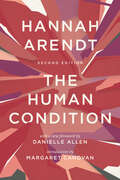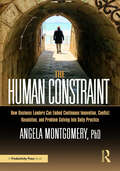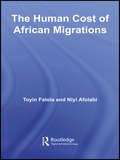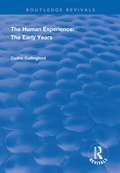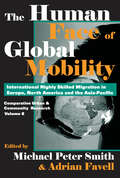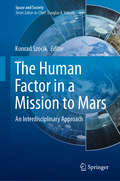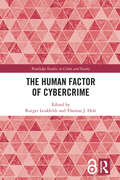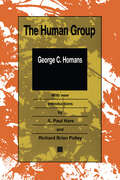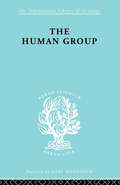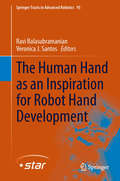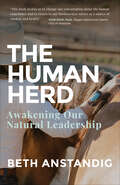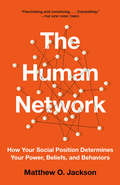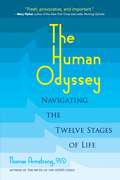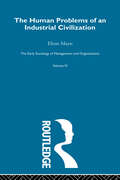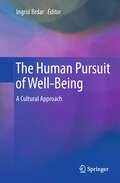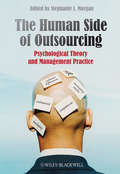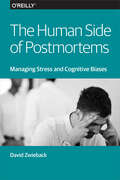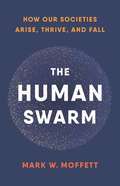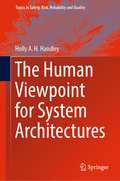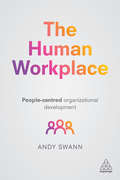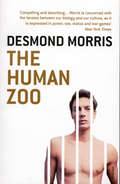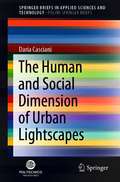- Table View
- List View
The Human Condition
by Hannah ArendtA work of striking originality bursting with unexpected insights, "The Human Condition" is in many respects more relevant now than when it first appeared in 1958. In her study of the state of modern humanity, Hannah Arendt considers humankind from the perspective of the actions of which it is capable. The problems Arendt identified then --- diminishing human agency and political freedom, the paradox that as human powers increase through technological and humanistic inquiry, we are less equipped to control the consequences of our actions --- continue to confront us today.
The Human Condition: Second Edition
by Hannah ArendtThe renowned political thinker and author of The Origins of Totalitarianism examines the troubling consequences of humanity’s increasing power.A work of striking originality, The Human Condition is in many respects more relevant today than when it first appeared in 1958. In her study of the state of modern humanity, Hannah Arendt considers humankind in terms of its ever-expanding capabilities. Her analysis reveals a troubling paradox: that as human powers increase through technological and humanistic inquiry, we are less equipped to control the consequences of our actions. This new edition contains Margaret Canovan’s 1998 introduction and a new foreword by Danielle Allen. A classic in political and social theory, The Human Condition offers a penetrating analysis of a conundrum that has only become more acute in the 21st century.
The Human Constraint: How Business Leaders Can Embed Continuous Innovation, Conflict Resolution, and Problem Solving Into Daily Practice
by Angela MontgomeryThe Human Constraint is a business novel with supplementary material for business leaders. It is inspired by dozens of implementations of the Decalogue methodology in Europe and North America since 1996. The Decalogue blends Deming’s philosophy with the Theory of Constraints in a cohesive, systemic approach to management. The novel explores an increasingly complex, interdependent and fast-changing world where companies must have a way to overcome obsolete mental models and embed continuous innovation in their operations with a coherent organizational model.The story in Part One unfolds during the financial crisis that follows 2008 and illustrates how this affects a group of executives engaged in a transformation process. It charts their attempts through the crisis to transform part of an industry dominated by a zero-sum game mentality using a very different approach: an ethical and value-based supply chain where all stakeholders benefit.Through the narrative in Part One, readers are exposed to a way to embed continuous innovation, conflict resolution, and problem-solving in action. In Part Two readers will find an introduction to a systemic method for management and the Thinking Processes from the Theory of Constraints.These Thinking Processes can help readers develop the skills to:■ Understand and analyze our current reality, as individuals and organizations.■ Surface assumptions that keep us trapped in less-than-desirable situations.■ Generate robust solutions/innovations.■ Identify unintended consequences of what may seem like an effective idea and avert them upstream.■ Resolve conflicts in a win-win way.The knowledge, method, and tools to overcome obsolete mental models and practices exist. This book aims to present the reader, through narrative and supplementary material, with elements of a new way and a new economics that are fit for purpose in our age of complexity.
The Human Cost of African Migrations (African Studies #1)
by Toyin Falola Niyi AfolabiIn an era of globalization, population growth, and displacements, migration is now a fact of life in a constantly shifting economic and political world order. This book contributes to the discourse on the beneficiaries, benefactors, and the casualties of African displacement. While the few existing studies have emphasized economic motivation as the primary factor triggering African migration, this volume treats a range of issues: economic, socio-political, pedagogical, developmental, and cultural. Organized with a multidisciplinary thrust in mind, this book argues that any discussion of African migration, whether internal or external, must be conceived as only one aspect of a more complex, organic, and global patterning of "flux and reflux" necessitated by constantly shifting dynamics of world socio-economic, cultural, and political order.
The Human Experience: The Early Years (Routledge Revivals)
by Cedric CullingfordFirst published in 1999, the focus of this ground-breaking study is on representing the mental world of the child with unprecedented clarity. Cedric Cullingford aims to show that this world, in its normal experience by children, is significantly unlike what we typically assume it to be, and significantly unlike anything exposed by the most prominent research programs. Querying common assumptions about children’s thinking, Cullingford begins with an outline of children’s understanding which emphasizes its range and complexity, along with an address of the mythology of children’s intellectual incapacity and preparation for the approach to be taken in detailing children’s construction of a sense of their world. The following four chapters combine to construct a description of how children approach their world, exploring theory of mind, the self, the family, the school and then the wider social and physical worlds. Cullingford achieves a vividness, immediacy and intensity not seen elsewhere, using the constant medium of the child’s gaze and demonstrating that the youngest child is not simply responsive but is active and critical in interrogating the world.
The Human Face of Global Mobility (Comparative Urban And Community Research Ser. #Vol. 8)
by Michael Peter Smith Favell AdrianAlongside flows of trade and capital, the free movement of professionals, technical personnel, and students is seen as a key aspect of globalization. Yet not much detailed empirical research has been completed about the trajectories and experiences of these highly skilled or highly educated international migrants. What little is known about these forms of "global mobility," and the politics that surround them, contrasts with the abundant theories and accounts of other types of international migration--such as low income economic migration from less developed to core countries in the international political economy. Drawing on the work of a long-standing discussion group at the Center for Comparative and Global Research of UCLA's International Institute, this collection bridges conventional methodological divides, bringing together political scientists, sociologists, demographers, and ethnographers. It explores the reality behind assumptions about these new global migration trends. It challenges widely held views about the elite characteristics of these migrants, the costs and consequences of the brain drain said to follow from the migration of skilled workers, the determinants of national policies on high skilled migrants, and the presumed "effortlessness" of professional mobility in an integrating world. The volume also sheds new light on international student migration, the politics of temporary, non-immigrant workers in the United States, new international forms of regulating movement, and the realities of the everyday lives of multinational employees in the world's transnational cities. Key differences between the regional contexts of this migration in Europe, North America, and the Asia-Pacific are also emphasized.
The Human Factor in a Mission to Mars: An Interdisciplinary Approach (Space and Society)
by Konrad SzocikA manned mission to Mars is faced with challenges and topics that may not be obvious but of great importance and challenging for such a mission. This is the first book that collects contributions from scholars in various fields, from astronomy and medicine, to theology and philosophy, addressing such topics. The discussion goes beyond medical and technological challenges of such a deep-space mission. The focus is on human nature, human emotions and biases in such a new environment.The primary audience for this book are all researchers interested in the human factor in a space mission including philosophers, social scientists, astronomers, and others. This volume will also be of high interest for a much wider audience like the non-academic world, or for students.
The Human Factor of Cybercrime (Routledge Studies in Crime and Society)
by Thomas J. Holt Rutger LeukfeldtCybercrimes are often viewed as technical offenses that require technical solutions, such as antivirus programs or automated intrusion detection tools. However, these crimes are committed by individuals or networks of people which prey upon human victims and are detected and prosecuted by criminal justice personnel. As a result, human decision-making plays a substantial role in the course of an offence, the justice response, and policymakers' attempts to legislate against these crimes. This book focuses on the human factor in cybercrime: its offenders, victims, and parties involved in tackling cybercrime. The distinct nature of cybercrime has consequences for the entire spectrum of crime and raises myriad questions about the nature of offending and victimization. For example, are cybercriminals the same as traditional offenders, or are there new offender types with distinct characteristics and motives? What foreground and situational characteristics influence the decision-making process of offenders? Which personal and situational characteristics provide an increased or decreased risk of cybercrime victimization? This book brings together leading criminologists from around the world to consider these questions and examine all facets of victimization, offending, offender networks, and policy responses.
The Human Factor: How to Realize the Potential of your People and your Business
by Michael Esau Simon HumphreysDevelop and leverage the human factor in your workforce and organization to boost individual and business performance. This book explores what the human factor is and how it influences the attraction, performance, retention, growth, productivity and wellbeing of employees. It also explains how focusing on it at all levels of the organization can boost both individual and business performance. It's a roadmap to success for all senior HR professionals, organizational development practitioners, managers and leaders. There is detailed discussion of sustainability, technology, analytics and organizational change, as well as a framework for building a case for change. The book also provides guidance on how to define organizational purpose, develop an effective organizational culture and how to design and execute a people strategy. There is also discussion of human motivation, the role it plays for individuals and leaders and the need for continual improvement of staff at all levels. Written by an expert author team with more than 50 years' experience between them, the book explains why the human factor is so important and how the changing context in which we live and work demands that HR professionals evolve to stay relevant.
The Human Group (International Library Of Sociology Ser.)
by George Caspar HomansGeorge C. Homans's classic volume The Human Group was among the first to study the small group as a microcosm of society. It introduced a method of analysis and a set of influential theories that cut across areas of specialization on the personality, community, and industry.The study of even the smallest groups is extremely complex, with the simplest associations involving an abundance of actions, relationships, emotions, motives, ideas, and beliefs. Homans concentrates on certain activities and processes he observes in five carefully selected and differentiated case studies and from them draws common patterns and ideas that serve as the bases of testable propositions.He divides his cases into static and dynamic groups. In all five cases, Homans selects comparable phenomena for analysis with a contextually different emphasis and elaboration each time. His results demonstrate that, different as these groups are, their behavior reveals fundamental similarities and social uniformities. A ground-breaking and authoritative work when it was first published in 1950, The Human Group continues to Inform and invigorate the study of small groups in sociology, psychology, management, and organizations.
The Human Group (International Library of Sociology)
by George C. HomansPublished in 1998, The Human Group is a valuable contribution to the field of Sociology and Social Policy.
The Human Hand as an Inspiration for Robot Hand Development
by Ravi Balasubramanian Veronica J. Santos"The Human Hand as an Inspiration for Robot Hand Development" presents an edited collection of authoritative contributions in the area of robot hands. The results described in the volume are expected to lead to more robust, dependable, and inexpensive distributed systems such as those endowed with complex and advanced sensing, actuation, computation, and communication capabilities. The twenty-four chapters discuss the field of robotic grasping and manipulation viewed in light of the human hand's capabilities and push the state-of-the-art in robot hand design and control. Topics discussed include human hand biomechanics, neural control, sensory feedback and perception, and robotic grasp and manipulation. This book will be useful for researchers from diverse areas such as robotics, biomechanics, neuroscience, and anthropologists.
The Human Herd: Awakening Our Natural Leadership
by Beth AnstandigThe Human Herd is a guidebook that helps readers unleash their mammal instincts and shows them how to heighten their self-awareness, experience their lives more deeply, improve their relationships, and step into a more natural—and powerful—way to lead.
The Human Network: How Your Social Position Determines Your Power, Beliefs, and Behaviors
by Matthew O. JacksonHere is a fresh, intriguing, and, above all, authoritative book about how our sometimes hidden positions in various social structures—our human networks—shape how we think and behave, and inform our very outlook on life.Inequality, social immobility, and political polarization are only a few crucial phenomena driven by the inevitability of social structures. Social structures determine who has power and influence, account for why people fail to assimilate basic facts, and enlarge our understanding of patterns of contagion—from the spread of disease to financial crises. Despite their primary role in shaping our lives, human networks are often overlooked when we try to account for our most important political and economic practices. Matthew O. Jackson brilliantly illuminates the complexity of the social networks in which we are—often unwittingly—positioned and aims to facilitate a deeper appreciation of why we are who we are.Ranging across disciplines—psychology, behavioral economics, sociology, and business—and rich with historical analogies and anecdotes, The Human Network provides a galvanizing account of what can drive success or failure in life.
The Human Odyssey: Navigating the Twelve Stages of Life
by Thomas Armstrong"This is truly a major contribution — brilliant, beguiling, and as broad in concept as it is deep." — Jean Houston, PhD, author of The Possible HumanThomas Armstrong, Ph.D., an award-winning educator and expert on human development, offers a cross-cultural view of life's entire journey, from before birth to death to the possibilities of an afterlife. Dr. Armstrong cites both clinical research and anecdotal evidence in a comprehensive view of the challenges and opportunities we face at every stage of our development. His accessible narrative incorporates elements of history, literature, psychology, spirituality, and science in a fascinating guide to understanding our past as well as our future."I loved the tone, the pacing, the sense of audience, and especially the richness of the associations . . . It's a book that one would like to keep around — a guidebook even." — John Kotre Ph.D., co-author of Seasons of Life: The Dramatic Journey from Birth to Death "The Human Odyssey is superb, magnificent, astonishing, unique, engrossing, eminently readable, informative, enjoyable, entertaining, profound. What else? I could go on. I hadn't expected anything like so remarkable a book." — Joseph Chilton Pearce, author of The Crack in the Cosmic Egg and Magical Child "I have read through The Human Odyssey. It is in many ways impressive. I also think that it has great commercial potential. Many people will find attractive your dual focus on the scientific and the soul/spiritual dimensions." — Howard Gardner, Ph.D., The John H. and Elizabeth A. Hobbs Professor in Cognition and Education at the Harvard Graduate School of Education, author of Frames of Mind "I extend my congratulations to you for this monumental undertaking and wish you the very best for your impressive efforts." — Marian Diamond, Ph.D. Professor, Department of Integrative Biology, University of California, Berkeley; co-author of Magic Trees of the Mind; pioneer researcher into the effect of the environment on brain development; dissected Einstein's brain "I very much enjoyed The Human Odyssey. Your breadth of sources is remarkable, and you have put them all together in a smooth and integrative way. I think it will be informative for people, and also inspiring for them to make their stages of life more meaningful. Overall, this is an impressive tour de force." — Arthur Hastings, Ph.D., Professor and Director, William James Center for Consciousness Studies, Institute of Transpersonal Psychology; Past President, Association of Transpersonal Psychology "Extraordinary. I hope that it is read by many people." — Laura Huxley, widow of Aldous Huxley, founder of Children: Our Ultimate Investment, and author of This Timeless Moment, and The Child of Your Dreams "A wonderful and encyclopedic summary of human development." — Allan B. Chinen, M.D., Clinical Professor of Psychiatry, University of California, San Francisco; author of Once Upon a Mid-Life: Classic Stories and Mythic Tales to Illuminate the Middle Years and In the Ever After: Fairy Tales and the Second Half of Life "Absolutely remarkable. The Human Odyssey is written with lively scholarship and contains great depth and breadth, a wide range of fascinating materials, and many useful resources. It's a kind of 'everything book.'" — George Leonard, "the granddaddy of the consciousness movement" (Newsweek) and author of The Transformation and The Ultimate Athlete"The Human Odyssey provides readers with a fresh approach to developmental psychology. Dr. Armstrong has included a spiritual dimension of human growth that is lacking from most accounts but which is essential for a complete understanding of the human condition. It is a splendid, brilliant work." — Stanley Krippner, Ph.D., former president of the Association for Humanistic Psychology, author of Personal Mythology: The Psychology of Your Evolving Self, and co-editor of The Psychological Impact of War Trauma on Civilians: An International Perspective "An integral approach to human development, from birth to death, that provides practical information for all who
The Human Problems of an Industrial Civilization (Early Sociology Of Management And Organizations Ser.)
by Elton MayoIn this volume Mayo discusses the Hawthorne experiments, relating the findings about human relations within the Hawthorne plant to the social environment in the surrounding Chicago area. The Chicago School of Sociologists were studying aspects of social disorganization and this was a topic pioneered by Emile Durkheim.
The Human Pursuit of Well-Being
by Ingrid BrdarThis book brings together the latest research on positive psychology from an international cast of researchers and particularly from the growing body of European researchers. The chapters describe research and practice from diverse fields of positive psychology, covering topics such as happiness and well-being, motivation and goals, personality, academic performance and coping, measurement and interventions. The book emphasizes a cultural approach to the human pursuit of well-being. It is unique in that it presents research from a range of cultures, such as Russia, Croatia, and Egypt, in addition to ten different Western cultures. This approach helps broaden our understanding of those aspects of human experience that make life worth living in diverse cultural conditions. The book includes well-known and new authors from the field and contains selected papers that were presented at the 4th European Conference of Positive Psychology held in 2008 in Croatia.
The Human Rights City: New York, San Francisco, Barcelona (Routledge Advances in Sociology)
by Michele GrigoloWe are used to thinking of human rights as a matter for state governments to deal with. Much less investigated is the question of what cities do with them, even though urban communities and municipalities have been discussing human rights for quite some time. In this volume, Grigolo borrows the concept of ‘the human rights city’ to invite us to think about a new urban utopia: a place where human rights strive to guide urban life. By turning the question of the meaning and use of human rights in cities into the object of critical investigation, this book tracks the genesis, institutionalisation and implementation of human rights in cities, focussing on New York, San Francisco and Barcelona. Touching also upon matters such as women’s rights, LGBT rights and migrant rights, The Human Rights City emphasises how human rights can serve urban justice but also a neoliberal practice of the city. This book is a useful resource for scholars and students interested in fields such as Sociology of Human Rights, Sociology of Law, International Law, Urban Sociology, Political Sociology and Social Policies.
The Human Side of Outsourcing: Psychological Theory and Management Practice
by Stephanie J. MorganOutsourcing is now a strategic choice for many companies and a continuing issue for managers and consultants. The transfer, negotiation and ongoing management of outsourced contracts all demand a great deal of people management. Yet, while the implications for those directly affected may be numerous and wide-ranging, very little has been written on how to sensitively and successfully manage the transfer of such individuals – along with the emotional needs of those left behind. This book considers The Human Side of Outsourcing, integrating theory and practice to offer state-of-the-art advice for those responsible for implementation in the field along with insightful analysis for researchers and students of work psychology. Examining problems and solutions from employee and employer perspectives, Stephanie J. Morgan provides an in-depth study of the psychological theory, management practice and level and type of support required to engage staff and improve outcomes. Real-world case studies illustrate all the key issues involved, along with their implications for HR, line management, organizational performance and employees themselves.
The Human Side of Postmortems: Managing Stress And Cognitive Bias In Devops
by Dave ZwiebackImagine you had to write a postmortem containing statements like these?"We were unable to resolve the outage as quickly as we would have hoped because our decision making was impacted by extreme stress.""We spent two hours repeatedly applying the fix that worked during the previous outage, only to find out that it made no difference in this one.""We did not communicate openly about an escalating outage that was caused by our botched deployment because we thought we were about to lose our jobs."While the above scenarios are entirely realistic, it's hard to find many postmortem write-ups that even hint at these "human factors." Their absence is, in part, due to the social stigma associated with publicly acknowledging their contribution to outages. And yet, people dealing with outages are clearly subject to physical exhaustion and psychological stress, not to mention impaired reasoning due to a host of cognitive biases.This report focuses on the effects and mitigation of stress and cognitive biases during outages and postmortems. This "human postmortem" is as important as the technical one, as it enables building more resilient systems and teams, and ultimately reduces the duration and severity of outages.
The Human Swarm: How Our Societies Arise, Thrive, and Fall
by Mark W. MoffettThe epic story and ultimate big history of how human society evolved from intimate chimp communities into the sprawling civilizations of a world-dominating species <P><P>If a chimpanzee ventures into the territory of a different group, it will almost certainly be killed. But a New Yorker can fly to Los Angeles--or Borneo--with very little fear. <P><P>Psychologists have done little to explain this: for years, they have held that our biology puts a hard upper limit--about 150 people--on the size of our social groups. But human societies are in fact vastly larger. How do we manage--by and large--to get along with each other? <P><P>In this paradigm-shattering book, biologist Mark W. Moffett draws on findings in psychology, sociology and anthropology to explain the social adaptations that bind societies. He explores how the tension between identity and anonymity defines how societies develop, function, and fail. <P><P>Surpassing Guns, Germs, and Steel and Sapiens, The Human Swarm reveals how mankind created sprawling civilizations of unrivaled complexity--and what it will take to sustain them.
The Human Viewpoint for System Architectures (Topics in Safety, Risk, Reliability and Quality #35)
by Holly A.H. HandleyThis book describes a methodology to represent socio-technical system concerns in the system architecting process. The resulting set of Human Views augments traditional system viewpoints with human-focused data. The Human Viewpoint methodology classifies the socio-technical system context, identifies and collects pertinent data, renders models that can be used for discussion and analysis, and presents the results in Fit for Purpose views that are useful for decision making. The inclusion of the Human Viewpoint during the system architecting stage allows the evaluation of human-system design trade-offs, recognises the impact of the human operator on system performance, and provides the foundation for Human System Integration evaluations during the ensuing system development.
The Human Workplace: People-Centred Organizational Development
by Andy SwannCompanies spend time and effort developing their employees - their most important asset - but they often forget to consider the company structure, culture, environment and processes required to help the newly upskilled individuals thrive. The Human Workplace is a practical guide which shows how this can be achieved by taking a truly people-centric approach to organizational development. Exploring how people-centred organizations behave and evolve, the book covers how to use design thinking to create optimal organizational structures, how to make a business a community, how to use communication to inform and empower people and how to use technology to allow employees to work more efficiently.Packed with interviews and case studies from Microsoft, Schneider Electric, CGI, Universal, Lego, SAP, BBC Worldwide and other global companies that have benefited from a people-centred approach, The Human Workplace redefines our view of the organization, its relationship with people and how we interact with it. It is an essential guide for all HR and OD professionals seeking to get the right people in the right places doing the right things at the right time.
The Human Zoo
by Desmond MorrisA must-read for anyone who has ever wondered why people do what they do, from the popular author of The Naked Ape.This study concerns the city dweller. Morris finds remarkable similarities with captive zoo animals and looks closely at the aggressive, sexual and parental behaviour of the human species under the stresses and pressures of urban living.‘Compelling and absorbing...Morris is concerned with the tension between our biology and our culture, as it is expressed in power, sex, status and war games’ New York Times
The Human and Social Dimension of Urban Lightscapes (SpringerBriefs in Applied Sciences and Technology)
by Daria CascianiThis book explores new criteria and characteristics for integrating human psychology in the design of modern urban lighting. It identifies a new area of lighting design research and practice that focuses on the nocturnal urban experience in terms of people’s emotional, cognitive and motivational perceptions to achieve more accessible, sociable and sustainable cities. In turn, the book compares new tools and research methodologies for tackling complex issues concerning the ties between lighting, people and the city. Moreover, it presents a series of case studies to provide an in-depth understanding of the influence of urban lighting in terms of luminous atmosphere perception, positive social affect, social enhancement, accessibility and hospitability. Lastly, the book proposes a multidisciplinary qualitative and quantitative methodology for assessing the spatial experience of outdoor lighting.

